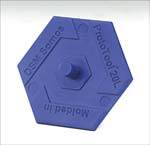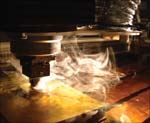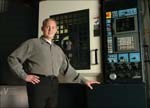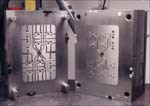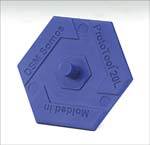IDEAS, INC.: Thinking Outside the Box
Entering the rapid tooling market resulted in a rapid growth spurt for this moldmaker—earning them the 2005 Leadtime Leader Honorable Mention: Small Shop.
|
IDEAS, INC. (Green, OH)—a comprehensive product development and contract manufacturing firm—made a strategic decision when entering the rapid tooling (RT) market nine years ago. "By 1996, our projects were suffering because of the leadtimes required to build high quality production molds," says Brad Borne, President/CEO of IDEAS. "It always came down to leadtime, quality or price—choose two out of three." Eighteen months of research led to the creation of a stand-alone profit center with a mission to build quality production molds at competitive pricing with compressed leadtimes. Today IDEAS, INC.'s Rapid Tooling Group (RTG) consistently delivers on that promise with an average leadtime of four weeks for production tools and a greater than 98 percent on-time delivery record. They have even gone so far as to deliver open and close production molds in less than 24 hours. "Our research naturally led us to evaluate all of the rapid prototyping (RP) technologies that could be applied toward RT," Borne notes. "We found that these technologies provided time savings in some cases, but their use was limited to simple parts and the tolerances and finishes were not up to production standards. We decided to invest in the technologies required to produce traditional molds using non-traditional methods." He calls his company's version of RT "an accelerated, technology-driven, mold building process." The backbone of IDEAS, INC.'s RT process leverages software, machine tools and people. The process is heavy on engineering, so the staff consists primarily of engineers and programmers. Craftsmen are utilized to complete the mold building process—and their contribution extends into the engineering realm as well. "What we have developed here is applied science, not rocket science," says Borne. "Since we built our RT process on a fully integrated 3-D CAD/CAM platform, we design, manufacture and verify every mold we build in a virtual environment. This allows us to automate the majority of the mold building process—which provides our cost and leadtime advantages. When it comes to manufacturing, we believe that people should map processes or strategies, and these strategies should be applied by machines to perform the large majority of all work (there should be low man-time in every job), and that craftsmen should only step in during final assembly or polishing—where a machine may not be viable or justifiable." IDEAS INC.'s primary focus of start-to-finish product development services has been well accepted by the industrial and medical electronics industries—but companies producing office products, lawn and garden products and automotive components also have been very receptive to this business model in recent years. Along with the RTG, IDEAS, INC. consists of a Product Development Group (PDG) and a subsidiary that specializes in contract manufacturing. Borne says that most of IDEAS' customers value the company's single-source capabilities. "More importantly we now have control over the entire process," he emphasizes. "Our clients love that we can make it happen—not to mention that it's always easier to work with one partner rather than several vendors." The LaunchIn 1993, Borne formed IDEAS, INC. as a product design and development firm. His background in product development with companies such as IBM, Lexmark and Telxon provided him with a different perspective toward mold building—the customer's. "Unlike most product design and development firms, this company was built on mechanical engineering principles," Borne explains. "Mechanical engineers are typically the bridge from concept to manufacturing. Industrial designers conceive the look and feel of a new product. By keeping all team members of all disciplines involved in a new product development effort, we keep the goal of the customer in mind." Three years later, Borne decided to start the RT division to "provide consistency in quality and leadtimes." He believes there are very few—if any—companies that can provide the end-to-end services his company offers. "We created the RTG because we could not find a mold shop that would consistently build production molds in a timely fashion with the required level of accuracy and quality," Borne explains. "Several shops would be glad to build molds for us in an accelerated timeframe—if their workload was light or we paid a considerable premium—but even then we still considered it to be slow (six to eight weeks). We realized that we could eliminate more than 50 percent of the time required for traditional mold building by properly applying modern engineering and manufacturing principles to the process" While IDEAS does offer prototype molds, they rarely build them today. "Since 2000 we have routinely focused more attention on production molds," Borne states. "Last year we only built a few prototype molds. We average 50 to 60 molds per year, mostly SPI class 101 to 103. We have limited capacity in our RTG, and I believe using our resources to build throw-away prototype molds is like driving a nail with an anvil. With our leadtimes for production molds the justification in producing prototype molds is greatly reduced. If we can't provide a strategic advantage to a client, then we won't waste our resources. They are simply too valuable to the rest of our customers." Management/Technology TriumphsIDEAS is able to maintain its stringent leadtimes by a "highly evolved process that allows precise and efficient equipment to perform 90 percent of the work required to produce high quality, high precision molds. This process is led and monitored by a strategic project management system that we have developed in-house that guarantees a smooth flow and leverages our investment in technology," Borne explains. The system is a combination of software packages that Borne notes is constantly evolving and will soon be Web-based for the benefit of its customers. "We already practice Just-in-Time (JIT, see In the Nick of Time Sidebar, above) manufacturing processes," he states. "For example, we perform very little work to our mold bases. That's all grunt work, and the mold base manufacturers do an excellent job with mold base customization. "Currently 90 percent of our work is done on CNC equipment that runs unattended," Borne continues. "We have our own Pro/E and SolidWorks training regimens that we conduct for all moldmakers and tooling engineers that combines the tutorials manufacturers provide with homework we assign." The company uses mechanical engineers with the most CAD experience from IDEAS' PDG to teach the finer points of the programs and conduct targeted one-on-one training, as Borne believes training classes alone are not sufficient to master the programs. "It is critical to our processes that our moldmakers become software gurus. They then earn the title of tooling engineer. By this time, they are capable of completely designing very complex molds or creating advanced CNC machining routines, as well as advanced assembly and surfacing tasks and electrode design. We call them tooling engineers instead of moldmakers, because that is what we are trying to accomplish: tooling derived from an engineering process. The old mentality of building molds—cutting it close enough, EDM'ing a lot, and then hoping the bench guy can make it fit together—doesn't work for us." Additionally, the company employs consultants to study its use of CAD tools; and IDEAS works with these consultants to help customize its software. To stay abreast of new technologies, the company stays in constant touch with application engineers from leading software, tooling, and machine tool companies. IDEAS also has recently purchased palletizing equipment for several of its machines that minimizes the man hours required for setup and is the first step toward robotic automation. "We're in the process of purchasing our first robot that will load and unload work and the tools specific to performing each job," Borne notes. "Then we plan on palletizing the entire shop, presetting all work coordinates offline and adding robots for inspection as well as other automated equipment." Forward ThinkingClearly, this company thinks outside the box when it comes to business and management philosophies—and this thought process extends to ensuring the company's long-term success. While Borne acknowledges the challenges of competing in a global economy, he is quick to point out his business hasn't been directly impacted by offshore competition. "We haven't lost business to offshore mold builders," he states. "We're well aware of the inherent advantage they have due to their reduced labor costs, but we have our own advantages. For instance, we adapt well to change, we're fluent in English, we're available when our customers need us—not 12 hours later, and we can complete a mold faster and ship parts with true overnight delivery—not three-day air plus customs clearance. "The impact we've felt is indirect," he continues. "It comes more from other shops that have been hurt by global competition. Other shops now have open time and are willing to offer more aggressive lead times. Our customer loyalty research shows that our ability to consistently deliver high quality molds in a timely fashion is very desirable. If we can continue to do that—and take care of the client beyond the mold building process—offshore will only make us stronger." Borne is not afraid to spend money in these uncertain economic times. "Company investment is not tied directly to profits," he asserts. "We have—and will—invest regardless of current profitability or economic outlook, which has only a minor influence on investment. We perform needs-based assessments throughout the year that identifies processes targeted for improvement. From this assessment we assemble a justifiable budget based on proven gains, which are usually calculated with the help of benchmarking equipment and changes in process. So invest, invest and invest! "But, invest wisely," he continues. "Conduct benchmarks when you buy new equipment, and make sure that your benchmarks are fair to you. It does you no good if you allow one vendor to have an unfair advantage, or for you to discount another vendor and not allow them a fair chance at earning your business, simply because of your initial perception of them. Be open-minded. I've seen a lot of shops in recent years who buy equipment because their buddy said it was the best thing going, or because it was made in a certain country, and therefore it must be of higher precision and quality—or simply because it was the first accelerated piece of equipment that they saw. If you can't be objective, it will hurt you and your employees." Clearly Borne believes in practicing what he preaches. The company has just secured a new facility approximately three times its current space and recently purchased the necessary equipment to set up an injection molding cell for sampling and low-volume production. IDEAS plans to move in Q2 of 2005. Furthermore, the company is working toward ISO certification, which it hopes to achieve it by Q4 2005, and is purchasing two additional high-speed machines this year. For having so much on his—and his company's plate—he can sum up his formula for success in one strong statement: "Specialize in something—pick anything—just do it better than the rest."
|
Related Content
MMT Chats: The Family of Business – From the Farm and into the Future
MoldMaking Technology Editorial Director Christina Fuges interviews the Eberle brothers of 2024 Leadtime Leader Award Winner Dynamic Tool Corp. about their moldmaking journey and the family dynamic of the business.
Read MoreDynamic Tool Corp. Wins MoldMaking Technology’s 2024 Leadtime Leader Award
Dynamic Tool Corp., a provider of engineered tooling solutions based in Menomonee, Wisconsin, has been awarded MoldMaking Technology’s prestigious 2024 Leadtime Leader Award. The announcement was made during a live awards ceremony at the Plastics Technology booth, where owners Steve and Ken Eberle accepted the award on behalf of their team.
Read MoreMoldMaking Technology's Most-Viewed Content of 2024
The most popular MoldMaking Technology content according to analytics reports over the past year.
Read MoreHonoring Excellence in Mold Manufacturing
After a brief hiatus, MoldMaking Technology’s Leadtime Leader Awards competition returns to recognize outstanding performance and innovation in the moldmaking industry.
Read MoreRead Next
Rapid Tooling Via Stereolithography Gets a Closer Look
Industry roundtable reports initial findings.
Read MoreHow to Use Strategic Planning Tools, Data to Manage the Human Side of Business
Q&A with Marion Wells, MMT EAB member and founder of Human Asset Management.
Read MoreAre You a Moldmaker Considering 3D Printing? Consider the 3D Printing Workshop at NPE2024
Presentations will cover 3D printing for mold tooling, material innovation, product development, bridge production and full-scale, high-volume additive manufacturing.
Read More
